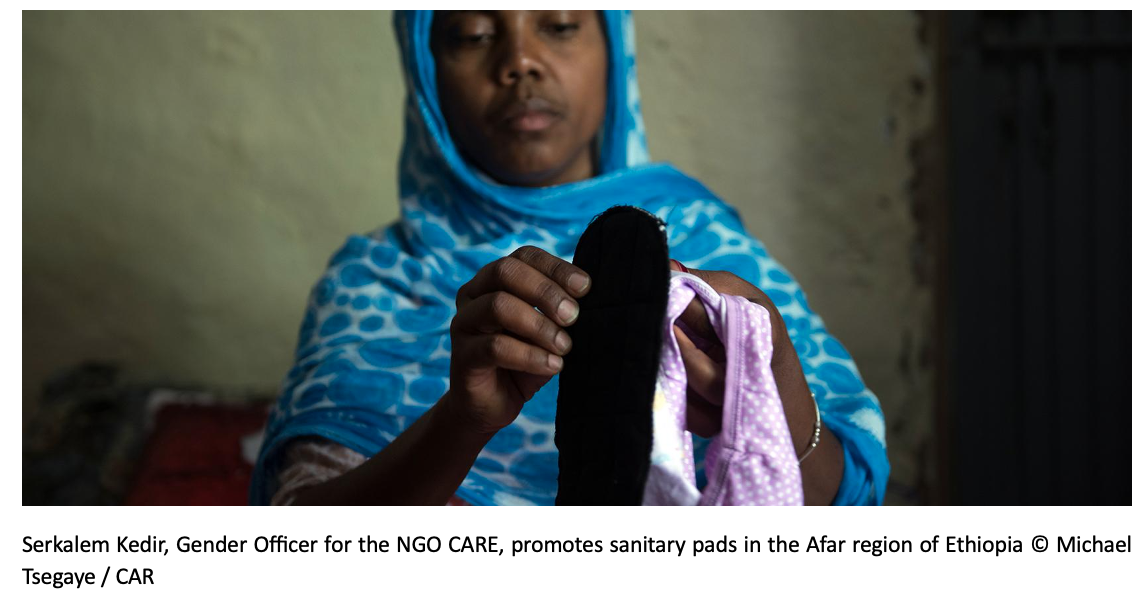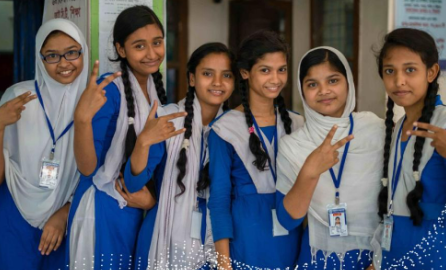Menstrual hygiene and health development at stake in Ethiopia

-
Gender marker: G2-Promotes gender equality as a primary objective
-
Period of implementation: 2022-2024
-
Amount: 3,000,000 EUR
-
Geographical area: Sub-Saharan Africa
-
(Co-) funded by: Agence Française de Développement (AFD)
-
Implementing partners: CARE together with a consortium of CSOs
-
Link to the project:
-
GAP III’s Areas:
-
Sexual and reproductive health and rights
-
Economic and social empowerment
-
Despite being key to achieving gender equality, menstrual health and hygiene remains a big taboo in society. As a result, many women and girls are denied their basic human rights during menstruation, in terms of education, health, work or water in a broader sense. Therefore, without access to reliable, complete and accurate information, adequate water and sanitation facilities, or affordable and quality menstrual products, women and young girls do not manage their menstruation safely and with dignity.
Yet despite this substantial impact on women’s lives, donor funding remains limited, fragmented and non-holistic. To address this funding gap and with the goal to mobilise private funding resources, the Agence Française de Développement - in association with the French Ministry for Europe and Foreign Affairs- selected the NGO CARE France together with a consortium of local CSOs to design and implement a pilot and innovative intervention in Adama, in the Oromia region, financed by a Development Impact Bond. The project aims at encouraging the adoption of adequate menstrual health and hygiene practices and addressing norms and beliefs related to menstruation among school-aged girls and their communities [1].
The Development Impact Bond (DIB) is an innovative financing instrument which mobilizes social investors from the private sector, here BNP Paribas, is prefinancing the intervention and will be reimbursed by AFD only if the project is a success in terms of impact. By placing the impact evaluation at the heart of the financing mechanism, it transforms the approach and pushes boundaries.
The launch of this development impact bond responded to the announcement made in the 2019 Sahel Partnership Action Plan 2019 under the French presidency of the G7. The choice of this innovative financing instrument is aligned with AFD’s strategy to mobilise NGOs in policy dialogue with public institutions and drive more private funding towards ODDs. It builds on French expertise in innovative development finance solutions.
Poor menstrual health and hygiene is still stigmatised in many regions of the world and is a major factor in school dropout, so it is part of France´s strong political commitment to address it and promote gender equality and sexual and reproductive rights.
This holistic intervention includes activities in all three pillars of menstrual health and hygiene and has a territorial approach with multiple entry points including universities, schools, clinics, factories in the city’s industrial park, and women’s groups to reach the most vulnerable women on the outskirts. It includes awareness-raising and advocacy activities to improve knowledge and sensitivity of menstrual health and hygiene among communities and to address norms and beliefs about menstruation. It also contributes to increase access to affordable menstrual products and to ensure a more diverse local supply that meets women’s different needs during menstruation. Moreover, the construction or rehabilitation of water and sanitation infrastructure will improve access to and use of gender-responsive, friendly and sustainable menstrual health and hygiene facilities in schools [2].
With a Development Impact Bond, the service provider is given more operational flexibility and benefits from impact information on what works and what does not. In this manner, compared to more traditional funding mechanisms, the DIB gives CARE as the main implementing partner and the different service providers more freedom to experiment with certain practices and adjust them as needed. Independent impact evaluation and strong accountability through a rigorous monitoring framework are designed to improve their performance.
Even more, the DIB aims at developing a public dialogue with sectorial ministries (education, health, water and sanitation, women) based on impact data. In terms of long-term impact, the aim is indeed to scale up the pilot project on the basis of its success, so that more girls and women can manage their menstruation with dignity and have equal economic and social opportunities.
“Most NGOs are distributing pads for free but this is not long-term impact. What the consortium led by CARE is doing is much more ambitious as it tries to understand the complexity and tackle the roots of the issue” Sonia Lioret, Deputy Head of the AFD office in Addis Ababa.
If you want to know more about menstrual health and hygiene in Eastern and Central African countries, have a look at LET’S TALK PERIOD!
[1] Extracted from: https://careevaluations.org/wp-content/uploads/MHH-DIB-Pillar-1-Assessment-Report-Final.pdf
[2] Extracted from https://www.itad.com/project/evaluating-menstrual-hygiene-and-health-development-impact-in-ethiopia/
